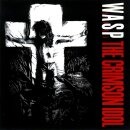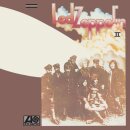Atlantic, 180g black vinyl. remastered, gatefold, In the 1960s and '70s, bands and labels ticked even faster. Led Zeppelin released one LP after another in their early years. Three long players within 15 months, that's breathtaking by today's standards. Since Led Zeppelin also frequently performed live, they even wrote all the songs for their first six albums between 1968 and the summer of 1972. The LPs "I" and "II" were extremely successful commercially and in the charts when they were released. "III," on the other hand, did not initially fare well in the press or with fans. The LP quickly topped the charts in the U.S. and the U.K., but sales dropped sharply after an initial high. Somehow Led Zeppelin was resented that not every album was the same and sounded the same. This, in turn, disgruntled Jimmy Page, who didn't speak to the press for two years as a result. And it led to the fourth album being released without a title or any accompanying lyrics. Therefore there are several titles for "IV": "Zoso", "Four Symbols" or simply "Untitled". Many Led Zeppelin fans consider the fourth album as the best of the band from today's point of view. The absolute sales figures confirm this: among the best-selling albums of all time in the U.S., it ranks third. "IV" is a perfect mix of hard and soft, light and dark. With "Stairway To Heaven" it contains Led Zeppelin's most famous number ever, while "Black Dog" is the essence of what made each of Led Zeppelin's musicians. In interviews, Jimmy Page does not have a good word to say about the first digital versions of Led Zeppelin's albums, which came onto the market in the mid-1980s. In his opinion, the sound is too undifferentiated because the CDs were produced from poorly mixed versions of the songs. This does not correspond to the quality demands of a world-class band. And since today the possibilities of digital remastering are highly developed for all formats, it was absolutely worth the wait. At least that's what Jimmy Page thinks and implores all fans not to listen to the reissues as MP3 under any circumstances. Under the aegis of Page himself, the digitally processed, remixed version of "IV" was created. The basis of the re-issues are the original analog studio tapes from 1970/71. Page's guiding principle for the remastering was that the albums were recorded for vinyl at the time and that nowadays there are a variety of recording formats, all of which have their justification and which the remaster should therefore do justice to.
| Item weight: | 0,35 kg |
Manufacturer:
Name: WARNER MUSIC Group Germany
Address: Alter Wandrahm 14, 20457 Hamburg, Germany
E-Mail: anfrage@warnermusic.com





